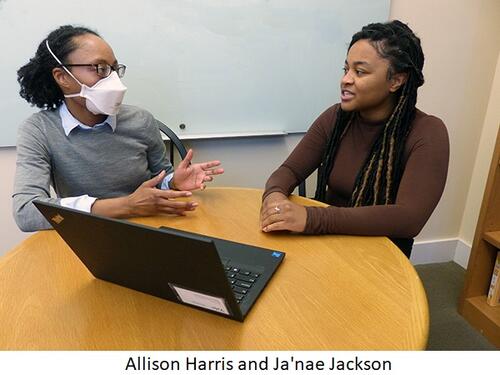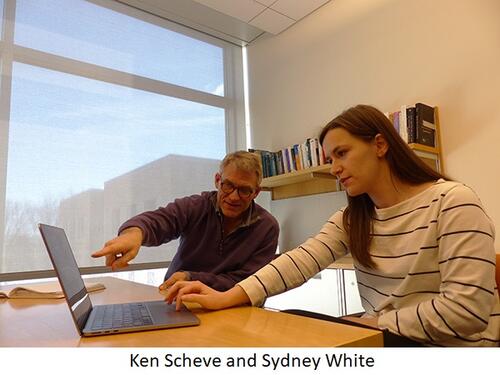Want a Head Start on Your Political Science Ph.D.? A Yale Predoctoral Program Offers Community, Mentoring, and a Crash Course in Research

As a predoctoral fellow at the Institution for Social and Policy Studies, Ja’nae Jackson works closely with her mentor, Assistant Professor Allison Harris. She participates in weekly meetings with Harris and her colleagues as they discuss current research findings and how to build on their work.
“I am able to see how faculty members brainstorm and come up with different ideas for the next project,” Jackson said. “It gives me confidence to talk with others about my own research ideas, and I know this will be an important process in graduate school.”
Jackson is one of five inaugural predoctoral fellows in a two-year program run in partnership with ISPS’s Center for the Study of American Politics (CSAP) and the Tobin Center for Economic Policy. CSAP is currently seeking applicants for eight new fellows to join this summer.
Jackson assists Harris with her research on American law and courts and the ways in which institutional change affects disparities in institutional outcomes. Harris, ISPS faculty fellow and assistant professor of political science, praised Jackson for how she has quickly developed skills in managing projects and people.
“She excels,” Harris said. “Ja’nae understands what this work and life entails and will enter graduate school with the skills she will need for a successful research career that many people don’t have until they have already earned their degree.”
Like the other predoctoral fellows, Jackson has applied to several graduate programs for next year. Harris said that the ISPS-Tobin program should help their chances.
“The predoc program exposes students to what the day-to-day work looks like, so they can make a better decision about what is right for them,” she said. “And it can help them craft the kind of personal statement that will signal to admissions offices that they know what will be required of them and what it takes to be successful.”
John Cho is a predoctoral fellow working with ISPS Director Alan Gerber, Sterling Professor of Political Science, and Gregory Huber, an ISPS fellow, chair of the Political Science Department, and Forst Family Professor of Political Science. Cho feels the program has provided a “crash course” in what it means to be a graduate student so that he can hit the ground running. And he expressed gratitude for the opportunity to work with leading scholars in the field of American politics and institutions.
“I’ve really appreciated being integrated into ISPS,” Cho said. “Attending weekly seminars, going to job talks, conducting research, co-authoring papers, and going through the entire process from conceiving a research question to executing it and submitting to journals. I feel confident in my ability to do it by myself next year.”
In addition, the fellows take classes, and Cho said that the program has helped him focus his academic interests.
“I’ve been exposed to so many questions in political behavior and can now pick out the types of things I want to research,” he said. “I think that would have been a lot more difficult if I applied right after graduating.”
Predoctoral fellow Sydney White works with Ken Scheve, Dean Acheson Professor of Political Science and Global Affairs, investigating comparative advantage during the second industrial revolution in the United States. While building datasets on iron and steel production, White has enhanced her coding skills and learned new ways to approach and use historical data sources.
She praised Scheve and Huber, who coordinates the program, for their mentorship.
“Greg and Ken have been very supportive of fellows trying to learn new skills,” she said, noting that in coursework, she also finds Yale political science professors to be helpful and supportive of research. “All of my instructors have been phenomenal. I can approach them about what I’m working on outside of class.”
Scheve said White has made their project richer and better.
“Working with Sydney has led to greater creativity and imagination in the project,” he said. “She is coming to the investigations from a different perspective, asking lots of questions. She is entrepreneurial in pursuing new data sources that are different from what I had in mind going in and helped us understand aspects I don’t think we would have otherwise explored.”

Danielle Hogan works as a predoctoral fellow with ISPS faculty fellows Christina Kinane and Joshua Kalla. After graduating from Brigham Young University with a degree in political science, Hogan spent three years working for the survey software company Qualtrics.
“My goal was always to go back to school and earn a Ph.D.,” Hogan said. “But it felt overwhelming to jump directly from the private sector without being involved in academia at all.”
The ISPS-Tobin predoctoral program has provided a useful on-ramp toward her goal as she learns from experienced faculty fulltime. But she said she has also gained valuable insight from her peers and current graduate students.
“It’s been great to have their feedback and understand what they are going through,” Hogan said. “And the networking aspect has been very beneficial.”
Predoctoral fellow Amelia Malpas echoed that sentiment.
“It’s one of the best parts of this job beside the actual job part,” Malpas said. “There is a built-in social network. If you are coming straight out of college, this can provide a pretty gentle transition to the real world. You are not isolated from your peers.”
Before earning a B.A. in politics and geography at Mount Holyoke College, Malpas thought she might want to become a campaign consultant in Washington, D.C. But she soon cultivated a taste for seeking answers to questions about our political institutions, particularly parties and how factions within parties relate to social and economic equality.
As a predoctoral fellow, she works with ISPS faculty fellow Jacob Hacker, Stanley B. Resor Professor of Political Science, where she has honed her quantitative research skills.
“One of the things that is so valuable is being in a space where it is OK that I didn’t take a lot of political science methods or statistics classes as an undergraduate,” Malpas said. “It’s great that I can take graduate statistics and methods classes and then apply these techniques in a practical way.”
Huber said he hopes the program can continue to expand — not just in numbers but in the types of students who eventually enter Ph.D. programs.
“Some students might not think they are ready for a top graduate program,” Huber said. “The success of our program can help encourage more people to find their confidence. It shows Yale’s commitment to investing in the future of political science.”
Huber said he is impressed with how the fellows fit at ISPS and CSAP.
“I think they are all going to get into the top programs,” he said. “Their applications were strong, and they are stronger now.
Before her senior year at Texas Christian University, Jackson attended the Ralph Bunche Summer Institute Program at Duke University. This competitive, intensive five-week program offers an opportunity for students from under-represented racial and ethnic groups to conduct political science research as an introduction to the rigors of graduate study.
The experience helped Jackson decide to pursue a Ph.D. in political science, but she now feels like the ISPS-Tobin program has provided the bridge she needed as she waits to hear back from graduate schools.
“I feel more confidence than in the Fall of 2021, when I was thinking of applying to graduate school,” Jackson said. “Reenergized to be a fulltime student again, much more confident in my ability to succeed, and excited to continue on this path.”